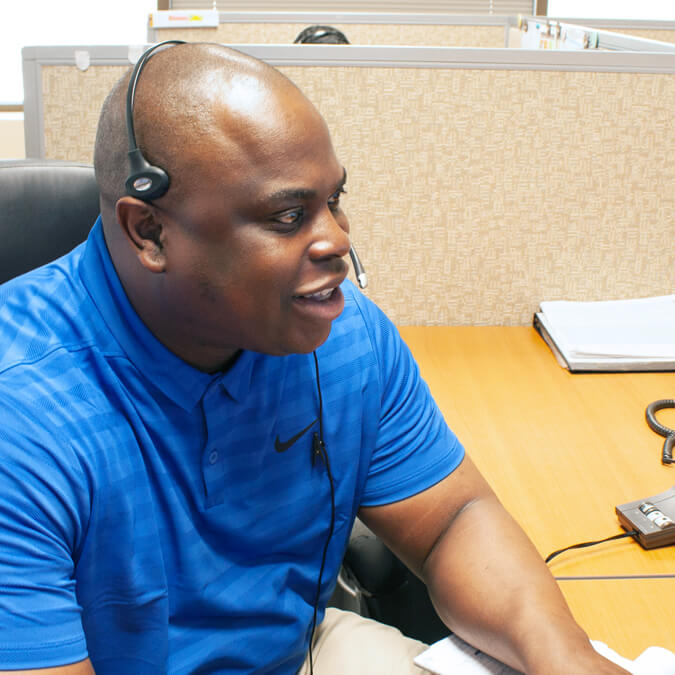
Texas Ignition Interlock Requirements
Texas drivers risk administrative and financial penalties if they are convicted of Driving While Intoxicated (DWI). For many drivers, a Texas state-approved ignition interlock device will be required in order to regain driving privileges. Intoxalock is a Texas approved ignition interlock provider and our devices meet all state criteria.
DEVICES AVAILABLE - If you need to install a device to meet your state requirements, we can help. Contact us today to schedule an installation appointment.
The Texas Interlock Program
Texas refers to drunk driving or alcohol-based driving offenses as DWI, and penalties include fines, jail time, and license suspension. The legal limit for drivers is below .08% BAC, but those with lower BAC may still find themselves facing consequences depending on the circumstances of the incident. Some offenders are able to regain driving privileges by installing a Texas state-approved ignition interlock device from an approved ignition interlock provider. This guide will explain the interlock policy in Texas.
What Are the Penalties for DWI in Texas?
First DWI Offense
- Fines up to $2,000
- Potential 180-day jail sentence
- License suspended for up to one year
- Required to take a 12-hour DWI education course
- May be required to install an ignition interlock device that meets with state approval in order to regain driving privileges
Second DWI Offense
- Fines up to $4,000
- 1 to 12 months in jail
- Required to take a 32-hours DWI education course
- Driver’s license revoked or suspended for up to 2 years
- Required to install an ignition interlock device that meets with Texas state approval in order to regain driving privileges
Third DWI Offense
- Fines up to $10,000
- Jail sentence of 2 to 10 years
- Required to take a 32-hours DWI education course
- License suspended or revoked for up to 2 years
- Required to install an ignition interlock device that meets with Texas state approval in order to regain driving privileges
Offenders who commit DWI with a child passenger in the car risk an additional charge of child endangerment. This comes with penalties including a $10,000 fine, two to 10 years in prison, and a loss of driving privileges for up to two years.
What Are the Penalties for Failure to Complete or Refuse to Submit to an DWI Test in Texas?
Offenders who refuse to take a DWI test when stopped on suspicion of DWI will still face penalties. They include immediate license suspension
How Can I Get My Driving Privileges Back in Texas?
Some drivers are eligible to regain driving privileges if they meet a variety of criteria. These criteria include:
- Complete the required 12- or 32-hour DWI education course and provide documentation within 180 days of conviction
- Serve out the required suspension period (not more than 2 years) and pay a $100 reinstatement fee
- Show proof of proper insurance coverage with an SR-22 certificate of coverage
- Serve out required probation period
- Install an ignition interlock device from an approved provider like Intoxalock
- Apply for an Interlock Restricted driver’s license
- If a driver's license is suspended in addition with the IID requirement, the offender may be able to apply for an Occupational License. Check with the court or your attorney to determine if you are eligible for this
Intoxalock Texas Ignition Interlock Devices
Intoxalock is an approved ignition interlock device provider in Texas. This means that the state has reviewed and approved the device and determined it to be reliable and meet state criteria. Testing data is shared with the appropriate state monitoring authority.
What is an Ignition Interlock Device?
Ignition interlock devices are also known as car breathalyzers or IIDs. They are installed into a vehicle’s ignition system and require testing before a driver can start their car.
- Driver must pass a breath alcohol content (BrAC) test and pass or the vehicle will not start
- Multiple test failures in a row may result in a device lockout, which will require customer service assistance
- Failing the test multiple times in a row can result in a lockout
- All failures are reported to the state’s monitoring authority
- During most trips, the IID will request random retests to prevent tampering and make sure the driver stays sober
How long is a Texas Interlock device required?
This will be clarified in court, but typically interlock devices are required throughout the entire license suspension period, and occasionally longer. If you are unsure, contact your attorney, the court, or your state department of motor vehicles for clarification.
The Process: What to Expect
-
Consult with Legal Counsel
Seek guidance from a DUI lawyer to understand your legal options and rights following a DUI violation.
-
Get an Assessment
Complete a court-ordered or voluntary assessment to evaluate your risk level and determine any required interventions.
-
Obtain Proof of SR-22 Insurance, If Required
If applicable, provide proof of financial responsibility and insurance coverage with an SR-22 certificate.
-
Schedule Interlock Install
Speak to our State Specialists to schedule your IID installation to meet court or state requirements.
-
Regular Monitoring
Your ignition interlock usage will be regularly monitored to maintain compliance with legal requirements.
-
Device Removal
After fulfilling your IID requirement and receiving approval from your monitoring authority, you can arrange to have your ignition interlock device removed at your local service center.
Texas Ignition Interlock Device Cost
*Intoxalock will cover up to $100 of your installation after mail-in rebate. A 6-month minimum lease is required to apply for this offer, and it only applies to Texas customers. This cannot be combined with any other offer. This deal is not applicable to voluntary leases.

Expert DWI Attorneys in Texas
Aaron Harper
Allen, TX 75013
Crawshaw Law Firm
San Antonio, TX 78215
The Law Office of Shane Phelps
Bryan, TX 77803
Trichter, Legrand, Houlton & White
Houston, TX 77007
Texas FAQs
What is an ignition interlock device and why do I need one?
An ignition interlock device is a breathalyzer that is installed in your vehicle to prevent drinking and driving. It is made up of a mouthpiece, a handheld unit and, a cord that attaches to your vehicle’s ignition system. You are required to blow into the mouthpiece to test your Breath Alcohol Concentration (BrAC) before starting your car.
What are the Texas ignition interlock device requirements?
To view Texas ignition interlock device requirements, please visit the Texas state page.
What are the steps to get my ignition interlock device in Texas?
Please visit the Texas state page to learn what steps you need to take to get back on the road.
What information should I provide to get my ignition interlock device installed in Texas?
To learn more about the steps to regaining your license, please visit our Texas state page.
How do I find an installation location near me in Texas?
To find the Texas Intoxalock service center closest to you, please visit our Texas installation locations page.
Where can I get my ignition interlock device removed in Texas?
Contact your monitoring authority to ensure you are eligible for removal.
What information should I provide to get my ignition interlock device removed in Texas?
Contact your monitoring authority to ensure you are eligible for removal and what paperwork must be provided in order to do so. Intoxalock will require a written removal order from a judicial source. For example, a writing from the Court, CSCD or other state/Judicial program.
What are the other DWI requirements in Texas?
Please visit the Texas state page to learn about other DWI requirements.
Where can I find other DWI resources such as DWI attorney, treatment center, or SR-22 insurance in Texas?
To find a DWI attorney, please visit our Texas DWI attorney partners page.
To find a treatment center, please visit our Texas alcohol treatment centers page.
How does an ignition interlock device work?
To see how an ignition interlock device works, visit our ignition interlock page and watch our video demonstrating how to use the device.
Where can I find more information on ignition interlock devices?
To learn more about ignition interlock information, please visit our ignition interlock device page.
Customers Have Great Things to Say
The information provided on this website does not, and is not intended to, constitute legal advice; instead, all information, content, and materials available on this site are for general informational purposes only. Information on this website may not constitute the most up-to-date legal or other information.
Readers of this website should contact their attorney to obtain advice with respect to any particular legal matter. Only your individual attorney can provide assurances that the information contained herein – and your interpretation of it – is applicable or appropriate to your particular situation.









